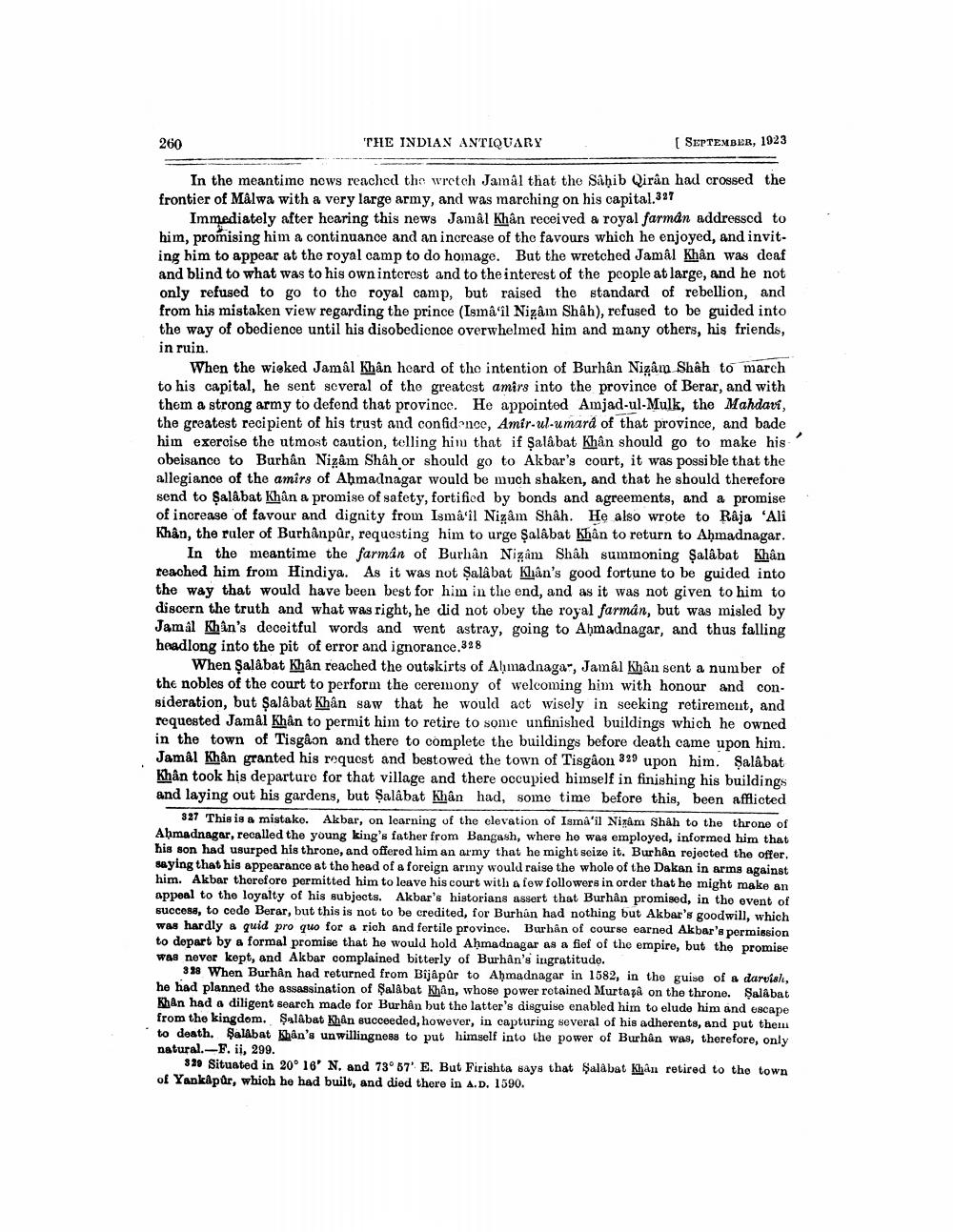________________
260
THE INDIAN ANTIQUARY
[ SIPTEMBER, 1923
In the meantime news reached the wretch Jamal that the Sahib Qirán had crossed the frontier of Malwa with a very large army, and was marching on his capital.327
Immediately after hearing this news Jamal Khân received a royal farman addressed to him, promising him a continuance and an increase of the favours which he enjoyed, and inviting him to appear at the royal camp to do homage. But the wretched Jamal Khân was deaf and blind to what was to his own interest and to the interest of the people at large, and he not only refused to go to the royal camp, but raised the standard of rebellion, and from his mistaken view regarding the prince (Isma'il Nizam Shah), refused to be guided into the way of obedience until his disobedience overwhelmed him and many others, his friends, in ruin.
When the wieked Jamal Khân heard of the intention of Burhân Nizam Shah to march to his capital, he sent several of the greatest amirs into the province of Berar, and with them a strong army to defend that province. He appointed Amjad-ul-Mulk, the Mahdavi, the greatest recipient of his trust and confidence, Amir-ul-umard of that province, and bade him exercise the utmost caution, telling him that if Şalábat Khân should go to make his obeisance to Burhan Nizam Shâh or should go to Akbar's court, it was possible that the allegiance of the amirs of Ahmadnagar would be much shaken, and that he should therefore send to Şalábat Khân a promise of safety, fortified by bonds and agreements, and a promise of increase of favour and dignity from Isma'il Nizam Shah. He also wrote to Raja 'Ali Khân, the ruler of Burhanpur, requesting him to urge Salâbat Khân to return to Ahmadnagar.
In the meantime the farman of Burhân Nizam Shah summoning Şalábat khân reached him from Hindiya. As it was not Şalabat khân's good fortune to be guided into the way that would have been best for him in the end, and as it was not given to him to discern the truth and what was right, he did not obey the royal farman, but was misled by Jamal Khan's deceitful words and went astray, going to Ahmadnagar, and thus falling headlong into the pit of error and ignorance,328
When Şalábat Khân reached the outskirts of Ahmadnagar, Jamal Khan sent a number of the nobles of the court to perform the ceremony of welcoming him with honour and consideration, but Şalábat Khan saw that he would act wisely in seeking retirement, and requested Jamal Khân to permit him to retire to some unfinished buildings which he owned in the town of Tisgaon and there to complete the buildings before death came upon him. Jamal Khân granted his roquest and bestowed the town of Tisgaon 329 upon him. Şalabat Khân took his departure for that village and there occupied himself in finishing his buildings and laying out his gardens, but Salábat Khân had, some time before this, been afflicted
327 This is a mistako. Akbar, on learning of the elevation of Isma'il Nizam Shah to the throne of Ahmadnagar, recalled the young king's father from Bangash, where ho was employed, informed him that his son had usurped his throne, and offered him an army that he might seize it. Burhån rejected the offer, saying that his appearance at the head of a foreign ariny would raise the whole of the Dakan in arms against him. Akbar therefore permitted him to leave his court with a few followers in order that he might make an appeal to the loyalty of his subjects. Akbar's historians assert that Burhån promised, in the event of success, to cede Berar, but this is not to be credited, for Burhún had nothing but Akbar's goodwill, which was hardly a quid pro quo for a rich and fortile province. Burhan of course earned Akbar's permission to depart by a formal promise that he would hold Ahmadnagar as a fief of the empire, but the promise Was never kept, and Akbar complained bitterly of Burhan's ingratitude.
338 When Burhan had returned from Bijapur to Ahmadnagar in 1582, in the guise of a darvial, he had planned the assassination of Salábat Khan, whose power retained Murtapa on the throne. Salabat Khan had a diligent search made for Burhân but the latter's disguise enabled him to elude him and escape from the kingdom, Sulabat Khan succeeded, however, in capturing several of his adherents, and put them to death. Salábat Khan's unwillingness to put himself into the power of Burhan was, therefore, only natural.-F. ii, 299.
370 Situated in 20° 16' N. and 73° 57' E. But Firishta says that Salábat Khan retired to the town of Yankápur, which he had built, and died there in A.D. 1590.




